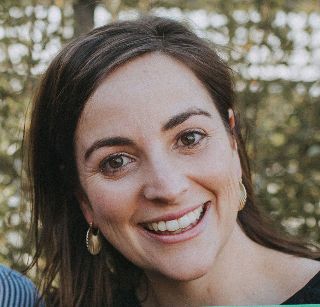The End of the World Is Bigger than Love is one of the six books shortlisted for this year’s Readings Young Adult Book Prize. It’s a magical, dystopian fairytale with twin sisters, an unreliable narrator, a bear and a whale. Our judges described it as ‘a hauntingly beautiful work.’
We asked author Davina Bell about writing inspiration, advice and process.
What was the initial inspiration for this story?
The initial inspiration for this story came from two illustrations, which isn’t all that surprising, given that I am a picture-book writer. One was a blank card I picked up at a café gift shop. It’s an illustration of a bear with a moody, desolate landscape inside him, and it made me think a lot about how bears are both cute play things and natural born killers. The other was something I saw on Instagram – an image of identical twin girls with their hair plaited together in one long braid – which seems really obvious now but felt profound at the time. Another piece was a passage I came across in 2011 when researching World War One. It described people catching the Spanish Flu, turning blue and dying within a day. The dramatic change of colour really stayed with me and became the inspo for The Greying (the illness that is sweeping the world of the novel). Who knew that this link to a global pandemic would feel so eerie all these years later.

What do you hope readers will take away from your book?
It’s my deep hope that readers will finish this novel with the sense that the end of the world ISN’T bigger than love – that love, in all its forms, is bigger than everything. And that in the face of tragedy, grief, heartache, trauma and disappointment, it is possible to move forward. One way we can do that is to try and make sense of the stories of our own lives, in all their glory and darkness. And to forgive ourselves in advance for how endlessly disappointing we will inevitably be. Asides from all that heavy stuff, I also hope they like the scenes with the talking whale.
What has been the best writing advice you’ve received?
This whole novel came out of something the author Martine Murray said in a writing class I took at RMIT. She told us, ‘Write the book that only you can write.’ This book is a love song to everything I find enchanting about the world. I’ve crammed it all in there – the books I adored as a kid, phosphorescence, Bonne Maman jam, twins, an egg roll I once ate in India, the caves in south-west WA where I first saw stalactites, my struggles with my mental health, Elvis, the ocean, the character of Aslan. Before I heard this piece of advice, I didn’t believe there was anything inside me that was interesting or worthy enough to find its way into a novel. And now, on the other side of this book, I feel as if I might never write anything again because it’s all in there already. And that would be fine.
The End of the World Is Bigger than Love is such a complex, sophisticated, astonishing, fantastic book. How many drafts did it take before you felt you were communicating exactly the story you saw in your head?‘
I’m still not sure I’ve communicated the story I saw in my head! Or if I even ever saw a complete story. It was more like a series of images, a colour palette and a feeling. But I’ve never had so little control over a narrative. This one revealed itself to me over the course of eight years, constantly changing and twisting on itself. I was still making changes – I’m talking quite big structural changes! Moving whole sections around, joining bits together and splitting others apart – right up until it went to print. My poor editor.


